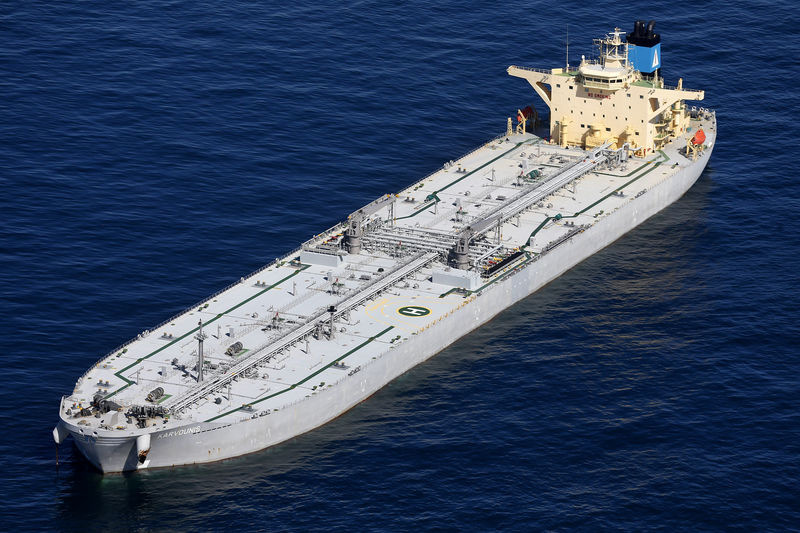By Collin Eaton (NYSE:ETN)
HOUSTON (Reuters) - The United States in January imposed sanctions on Venezuela's most important global business - producing and selling crude oil - as the Trump administration ratcheted up its bid to force socialist president Nicolas Maduro out of power.
Venezuela's oil exports - accounting for more than 95 percent of the country's export revenue - have dropped by some 40 percent since January. At the same time, it has been unable to import all the fuel it needs for blending with its heavy crude, as well as for domestic consumption.
The United States and many Western governments have recognized Venezuelan opposition leader Juan Guaido as the country's rightful head of state. However, Maduro remains in power for now.
HOW MUCH OIL IS VENEZUELA CURRENTLY PRODUCING?
Venezuela's crude production was between 732,000 and 960,000 barrels per day (bpd) in March, according to self-reported figures and secondary sources quoted by the Organization of the Petroleum Exporting Countries (OPEC) in its April oil market report. That compared to output of 3 million bpd at the turn of the century.
HOW MUCH CRUDE AND REFINED PRODUCTS IS IT EXPORTING?
Venezuela exported about 1.06 million bpd of crude and refined products in April, up slightly from 980,000 bpd in March, according to data from Refinitiv Eikon. Exports sank 40 percent in February, the first full month after the sanctions were imposed.
WHERE IS THAT OIL GOING?
The United States, India and China were Venezuela's biggest customers prior to sanctions, with the United States the biggest cash buyer.
India and China have accounted for most of Venezuela's crude exports since sanctions took effect. Europe has also absorbed more. Last month, more Venezuelan crude cargoes headed to China, and fewer cargoes were steaming toward India, Refinitiv Eikon data show. Cuba remains a notable destination as well.
WHAT ABOUT U.S. IMPORTS?
U.S. imports of Venezuelan crude have collapsed to zero in the wake of sanctions. However, 186,000 bpd was imported in the week ended April 26 - a signal, traders said, that companies were taking the last shipments allowed in a wind-down period that ended April 28.
In the week ended Jan. 25, just before sanctions were announced, U.S. refineries imported 587,000 bpd.
WHY IS VENEZUELAN CRUDE SO IMPORTANT?
Heavy crude supplies of the kind Venezuela pumps are constrained worldwide. Large producers, such as Canada and Mexico, are unable to lift exports to replace the lost barrels and smaller producers, including Colombia and Ecuador, simply do not pump enough to ease the global shortfall.
Complex U.S. Gulf Coast refiners use heavy crude as part of a mix to create high-margin distillate products.
WHO WERE THE BIGGEST U.S. CUSTOMERS?
U.S. refiner Citgo Petroleum, a subsidiary of Venezuela's state-run oil firm PDVSA, imported more than 175,800 bpd of Venezuelan oil in 2018, according to Refinitiv Eikon.
It was followed by Valero Energy Corp (NYSE:VLO), which imported about 166,000 bpd last year, and oil major Chevron Corp (NYSE:CVX), with about 83,000 bpd.
WHERE ARE U.S. REFINERS FINDING REPLACEMENT BARRELS?
Chevron, Valero and Citgo have turned to producers of heavy crude in Colombia, Iraq, Saudi Arabia and Canada, as well as sour grades produced in the U.S. Gulf Coast by BP (LON:BP) PLC and Royal Dutch Shell (LON:RDSa) PLC, traders and brokers said.
Valero has said it has used domestic blends, Canadian crude and a mix of other grades, including crude from Brazil. The U.S. refiners have also secured more crude from West Africa as a replacement, traders said.
WHAT WILL IT TAKE TO REPAIR THE VENEZUELAN OIL INDUSTRY?
Venezuela might open its oil industry to foreign investment and limit the role of PDVSA, which currently controls all joint ventures in the OPEC-member nation, said Ricardo Hausmann, Guaido's representative before the Inter-American Development Bank.
WHAT ELSE IS VENEZUELA EXPORTING?
Venezuela has stepped up shipments of gold to other countries, sending more than $900 million to Turkey in 2018, according to Turkish government data and trade reports.
Caracas is using some proceeds from those sales to buy Turkish consumer goods, according to opposition legislator Carlos Paparoni. Turkish pasta and powdered milk are now staples in Maduro's subsidized food program. Trade between the two nations grew eightfold last year.
